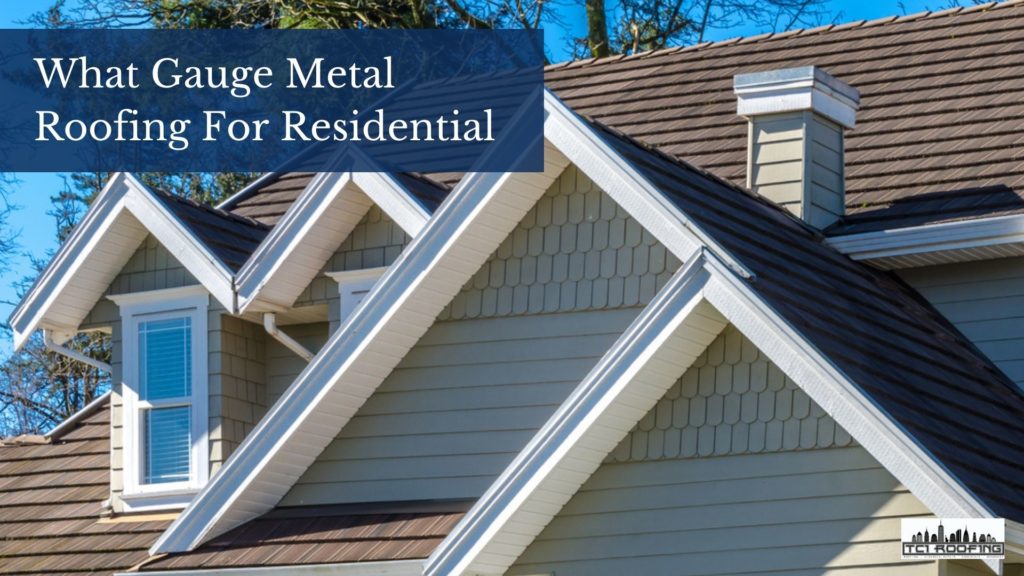What gauge residential metal roofing do you need? The answer to that question depends on several factors. If you decide that metal roofing and not asphalt shingles are the best fit for your home, then consider a few things before buying it. This blog post will give you information about residential metal roofing and how it differs from other types of residential roofing. We’ll also discuss the different gauges available and what is the best residential roofing near you so that you can determine which one is right for your home!
What Gauge Metal is Best For Residential Roofing?
The answer to this question depends on the application and what you need for your home. If you’re considering residential metal roofing, there are a few factors that should be considered before deciding which gauge is best for your needs: Do I want a standing seam? This will affect how much wind uplift protection you need. Also, what is the region where I live? This will help determine how much UV protection you’ll need and if special coatings are needed for your residential metal roofing.
Unlike roofing shingles, metal roofs come in a variety of gauges, so there’s something out there that works with your needs! Make sure also to choose the best roofing contractors for your residential roofing system projects.
How Long Will a 29 Gauge Metal Roof Last?
The metal roofing you choose is only as good as the gauge it is made out of. The lower the number, the thicker and more durable it will be, which means that a 29 gauge metal roof will last longer than one with a higher number. In addition, other factors such as the roofing materials type can affect how long your residential roofing will last. For instance, metal roofs that are made out of copper or zinc have a much longer lifespan than steel roofs do.
Can You Walk 29 Gauge Metal Roof?
Yes! Metal roofing systems are not slippery, and they do not collapse underfoot. It is one of the most durable types of residential roofing available, so you don’t have to worry about it giving out on you due to weight or other factors such as snowfall. If you want a metal roof that is safe for residential use, then 29 gauge is the way to go.
Is 26 Gauge Metal Roofing Hail Resistant?
If you live in an area where hail storms are common, metal roofing can protect your home from damage. However, if you want to ensure that the metal roofing has been tested for strength when protecting against hail-sized objects, look for 26 gauge since they have passed the test. 26 gauge metal is the most effective to use against hail damage, and it is one of the best residential materials out there.
Is 22 Gauge Steel Strong?
22 gauge steel is affordable and aesthetically pleasing, but it isn’t as strong as 22 or 26 gauge residential metal roofs. The reason for this has to do with the thickness of the steel- residential 22 gauge steel is not thick enough to allow you to walk on metal roofs comfortably, nor does it protect against hail damage like metal roofs do.
In installing your metal roofing make sure that you choose the best residential roofing services! We at TCI Manhattan can help.
What Are The Disadvantages of a Metal Roof?
While metal roofs have several benefits, they do come with some disadvantages as well. One disadvantage is that they are not fireproof, nor are they resistant to rusting or termites which means there’s a chance it may need repairs from time to time. In addition, residential 22 gauge steel roofing requires more maintenance than metal roofs do. Finally, while residential 22 gauge steel roofing is affordable and aesthetically pleasing, it isn’t as strong as 26 or 29, making repairs more necessary.
Does a Metal Roof Lower Insurance?
Insurance companies for metal roofing make your home more fire-resistant, which means they may be willing to lower residential insurance rates. However, there is no guarantee that you’ll receive a discount for having residential metal roofing since many factors affect how much impact the residential metal roof will have on lowering residential insurance premiums. If you want metal roofing that can reduce premiums, then residential 29 gauge residential metal roofs will be the most effective at doing so.
What is The Thickness of 7 Gauge Steel?
The thickness of 7 gauge steel is 0.1793 in inches and 4.554 in mm. The steel gauge rating may appear backward: the lower the number, the thicker the steel. 7 gauge steel is substantially thicker than 12 gauge steel. The thickness of the steel also matters; the thicker the steel, the stronger it is. When comparing safes, keep in mind that the smaller the steel gauge, the thicker the steel.
Thoughts
When comparing gauge and metal roof pricing, consider that two roofs that appear the same may have radically different metal thicknesses. And virtually without exception, the thicker gauge material will be stronger, more wind-resistant, and more resistive foot activity and last longer.
If you’re looking for a residential roofing contractor near your area for your new roof project soon, we at TCI Manhattan can help! Whether you want metal roofing or slate roofing, we can assist you with specifying and acquiring the ideal version for your work. So please get in touch with us right away; we are delighted to help you determine the appropriate type and gauge of metal roof for your home. We also offer a free estimate and roofing options!

